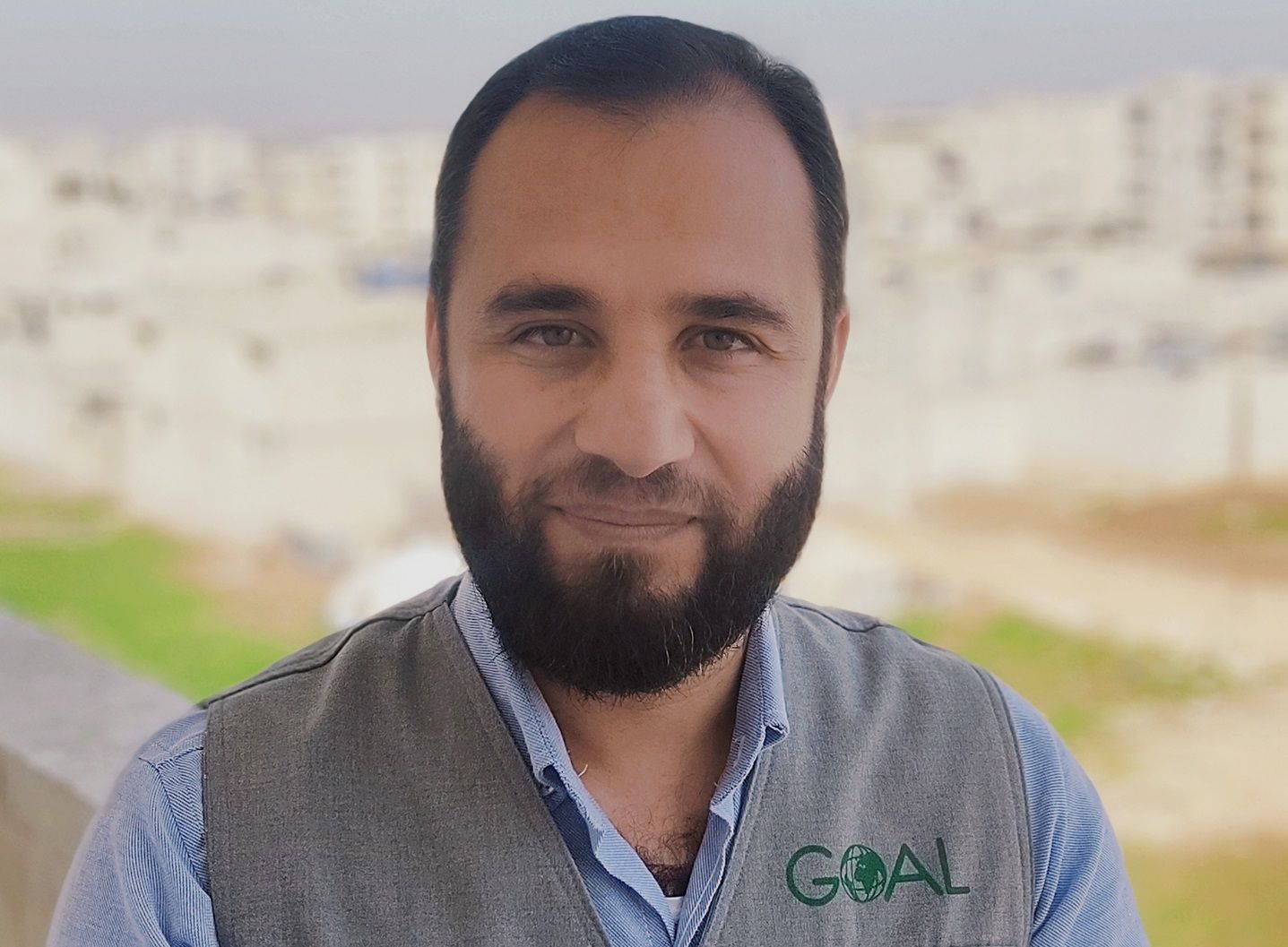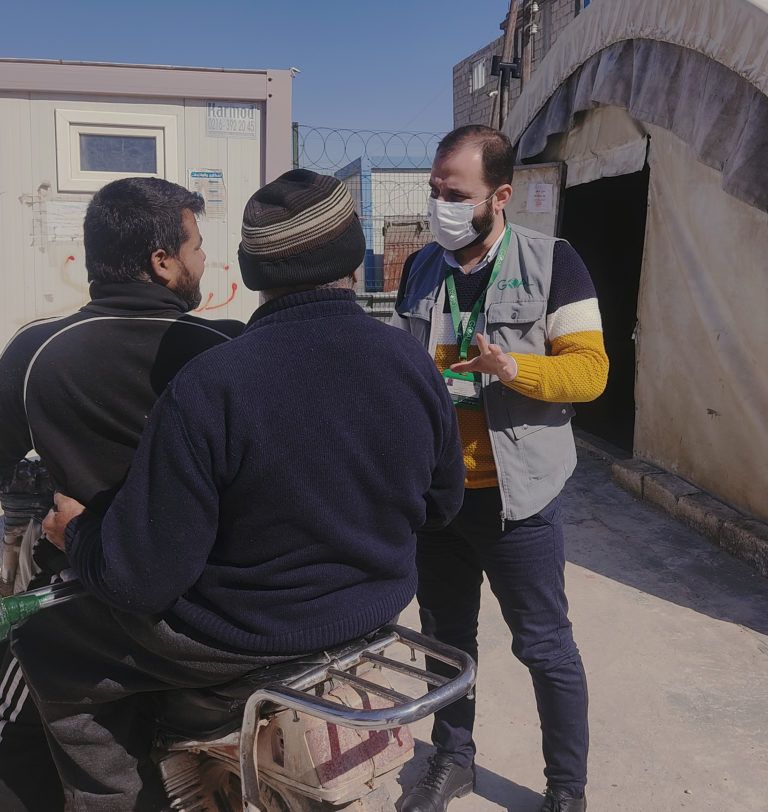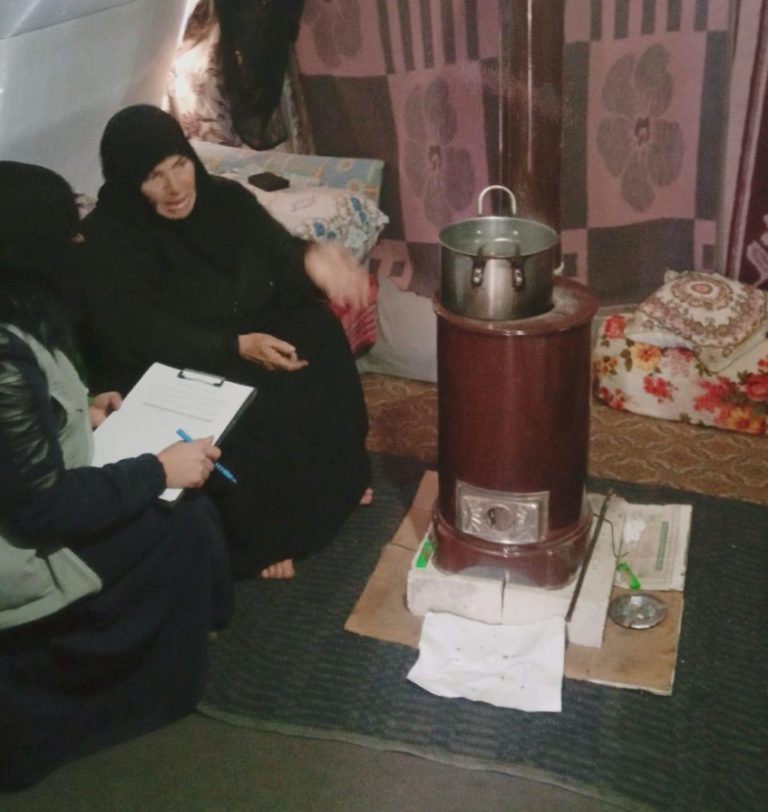 Blogs
Blogs
April 22, 2022 • 5 min read
by Mazen Maari, Deputy Emergency Response Manager with GOAL Syria
In 2011, when the conflict started, I had just graduated from the Faculty of Agricultural Engineering at the University of Aleppo and was due to begin studying for a master’s degree in Food Sciences. My father, mother, five brothers, two sisters and I all lived in our family’s ancestral village in the countryside of Idleb.
Our village was turned into a warzone soon after the start of the conflict, becoming a battle hotspot due to its proximity to the highway that connects the Mediterranean cost to Aleppo. Fleeing the constant shelling on our neighborhoods became a common occurrence, but until late 2013 we were able to return home after a few days of refuge in nearby villages. A full-scale military operation then emptied the village of its inhabitants. Thinking once again that we would be able to go back soon, we took just a few days’ worth of clothing with us. Little did we know that nearly a decade would be spent displaced.

Mazen Maari, Deputy Emergency Response Manager with GOAL Syria
In the beginning, we had no idea about where we could go. This was probably the most difficult period of all. Our entire village moved together. The situation for the women and children was very difficult and shelter was in very low supply. All of the men slept in a single room and the women in another, as the children’s screams and crying, full of fear, filled the night.
We all soon found ourselves dispersed. My family zigzagged between the Al Roj Plain, Salqin City, and Kafr Takharim Town in Idleb. Years later, after the attacks slowed down for a period, my parents, one of my brothers and one of my sisters returned to our village. My three younger brothers and my other sister sought refuge in Turkey.
Expanding Humanitarian Assistance
I began working at GOAL in November 2013. I decided to work in humanitarian aid because I wanted to give to my country and my people in this hour of need, like many other young men and women of my generation. My experience of the torment of displacement was also a motivating factor. Knowing what it means to suddenly have to leave your home with only the clothes on your back, understanding the pain of finding yourself separated from your family, teaches you the importance of trying to ease displaced communities’ suffering.
In September 2020, as we expanded our humanitarian assistance activities in Northern Aleppo, I was appointed as the Deputy Emergency Response Manager for this area. Our local team of 15 focus on monitoring critical developments in our area that can require an urgent humanitarian response. This can include dealing with flooding and snowstorms in the camps or assisting people who are displaced from towns and villages because of intense shelling and air raids. We also reach tens of thousands of families every year with assistance to help them meet essential needs, like heating fuel and warm clothing, throughout the coldest days from December to March.

GOAL’s Mazen Maari, with beneficiaries of GOAL programmes in Sharamarin Village in Azaz District in Northern Aleppo.
When heavy snowstorms began to fall on Northern Aleppo from the third week of January this year, we knew we had to reach out immediately to the residents of the displacement camps here as people who have sought refuge in tents would be affected the most.
Both the main roads and the roads within the camps were very difficult to get through, but the speed with which we were able to deliver assistance to displaced families was truly appreciated by the communities of Northern Aleppo. I think this is what distinguishes emergency humanitarian work – you respond directly to people’s needs, and as you do, you empathise with them, sharing in the pain they feel, and try to ease their suffering and meet their needs as soon as you can.
Raya’s Story
For Raya, a 61-year-old woman who lives with her 40-year-old disabled son in a tent in Habat al-Baraka camp in Afrin, our support meant access to firewood, charcoal, and warm clothing. She says that this assistance came in time, allowing her to use what little money she has to buy medicine and food rather than have to spend it on heating materials.
“Winter was a special time in our village, but here it does not pass without leaving damage on both our shelters and our nerves. Throughout the cold months, it never gives me peace of mind, the need to secure heating fuel and ensure that my son’s health does not get worse because of the freezing weather,” she adds.
We have reached around 10,000 people in Northern Aleppo in our disaster response and preparedness work this year, but we know we have to do more. We need to ensure that humanitarian programmes in Northwest Syria go beyond emergency response to give people sustainable medical, nutrition, water, and education services.

A GOAL team member visits Raya, a 61-year-old displaced woman residing in Habat al-Baraka Camp in Sharan, Northern Aleppo.
Helping Rebuild Lives
At GOAL, we have also recently started to focus on providing humanitarian assistance through cash-based modes of aid delivery, which can serve to help sustain local markets and contribute to economic recovery. Cash-based assistance also gives community members more choice in utilising humanitarian aid. The provision of in-kind assistance, such as core relief items, can be lifesaving immediately after a crisis. It can, however, also be the case that this in-kind assistance may not always meet the needs of all beneficiaries, who sometimes end up exchanging the items provided for supplies that are more useful for their families.
Through new humanitarian approaches like cash-based assistance that we can start to bridge meeting immediate needs to early recovery efforts and economic development. And it is only through establishing such bridges that we will be able to not only save more lives, but also to support pathways to dignified livelihood opportunities.
Every displaced person’s wish is to return to their home and reunite with their family on their own land. Unfortunately, it does not seem that this wish will become a reality for us anytime soon. After 11 years of war, Northwest Syria’s displaced and other conflict-affected communities need humanitarians to do more to provide them, not only with aid and assistance, but the support they need to start rebuilding their lives.
